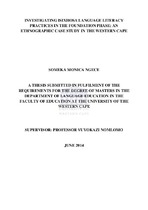| dc.contributor.advisor | Nomlomo, Vuyokazi | |
| dc.contributor.author | Ngece, Someka Monica | |
| dc.date.accessioned | 2015-05-20T08:00:14Z | |
| dc.date.available | 2015-05-20T08:00:14Z | |
| dc.date.issued | 2014 | |
| dc.identifier.uri | http://hdl.handle.net/11394/4157 | |
| dc.description | Magister Artium - MA | en_US |
| dc.description.abstract | This study investigated language literacy practices of Grade 3 teachers and learners in the Foundation Phase where isiXhosa was used as a medium of instruction. It explored the extent to which the instructional practices enhanced or hindered literacy development in the Grade 3 classroom in one school located in a disadvantaged area in the Western Cape. This study followed a qualitative ethnographic case study design. Qualitative data collection techniques, namely, classroom observations, interviews and document analysis were used to collect data for this study. The findings of this study indicate that there are many pedagogical or instructional challenges that tend to impede learners’ literacy development. The use of resources is also a concern with regard literacy instruction. The study concludes that literacy instruction or pedagogy determines literacy practices, regardless of the language used for learning and teaching. | en_US |
| dc.language.iso | en | en_US |
| dc.publisher | University of the Western Cape | en_US |
| dc.subject | isiXhosa | en_US |
| dc.subject | Literacy | en_US |
| dc.subject | Constructivism | en_US |
| dc.title | Investigating isiXhosa language literacy Practices in the foundation phase: an ethnographic case study in the Western Cape | en_US |
| dc.type | Thesis | en_US |
| dc.rights.holder | University of the Western Cape | en_US |

